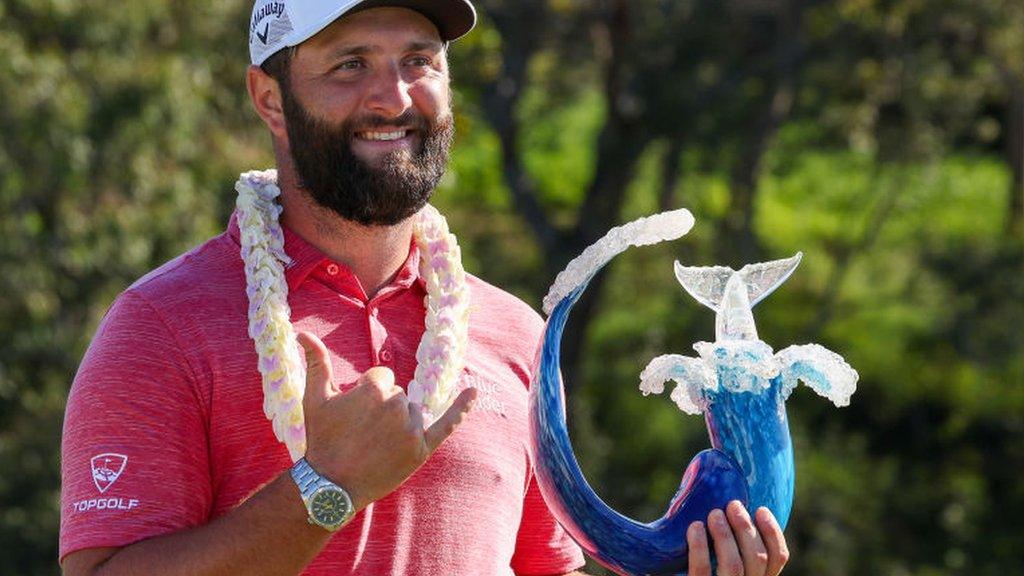PGA Tour and DP World Tour's proposed deal with Saudi Arabia's Public Investment fund misses deadline
- Published
- comments

Jon Rahm will not be defending his Tournament of Champions title in Hawaii this week after opting to leave the PGA Tour for LIV Golf
Trumpeted as the start of a new era, the 2024 PGA Tour season begins this week with its opening 'signature event' which comes at a time when men's professional golf remains mired in undermining uncertainty.
A framework agreement between the tour and its DP World Tour counterparts and Saudi Arabia's Public Investment Fund (PIF), should have been ratified by the turn of the year.
The deadline on the deal, which we were initially told would take only weeks to conclude, has come and gone. It was marked only by a memo to his players from the PGA Tour's commissioner Jay Monahan.
The American circuit's boss said that they are working to extend negotiations based on progress made in recent talks.
But the bottom line is that there is still no resolution to the shock announcement on 6 June last year of a potential alliance between the PGA Tour and the backers of the breakaway LIV setup.
Last month's talks were delayed while the PGA Tour busily tried to secure billions of dollars of investment.
The Strategic Sports Group (SSG), a consortium of billionaires headed by Tom Werner and John Henry's Fenway organisation that owns Liverpool Football Club and the Boston Red Sox are now on the verge of signing a deal.
"As you know, the [PGA Tour policy board] unanimously directed management to pursue exclusive negotiations with SSG," Monahan stated in the memo.
"I am pleased to report that we have made meaningful progress and have provided SSG with the due diligence information they requested."
Monahan said the tour is now in the final stages of securing an arrangement which is thought to be worth more than $3bn (£2.37bn) and will create a newly formed company, PGA Tour Enterprises, which will be a for profit entity.
They are looking for a similar sum from PIF to help create an organisation that could then potentially unite the game, bringing together LIV, the PGA Tour and the European based DP World Tour.
"Our goal for 2024 is to reach agreements with SSG, PIF and the DP World Tour, bringing them on board as minority co-investors in PGA Tour Enterprises," Monahan wrote.
"These partnerships will allow us to unify, innovate and invest in the game for the benefit of players, fans and sponsors."
For Monahan it is a Utopian vision. Reservations over doing business with Saudi Arabia and its questionable human rights record have long since been buried.
The imperative now is financing a slew of $20m tournaments brought in, ironically, to keep pace with LIV's lucrative schedule.
Money trumps everything, as the Saudis proved by luring Jon Rahm at the end of last year. The recruitment of the Masters champion was a massive statement at a crucial moment.
"The timing could not have been worse," a senior figure from the establishment side told me soon after the European Ryder Cup hero signed for a reputed $300m.
But, from the Saudi perspective, the timing could not have been better.
Just when the PGA Tour were looking elsewhere for investment, the disruptors dipped into their bottomless reserves to show that pretty much every golfer has a price - and they can pay it.
This suggests that, even after attracting billions of dollars of homegrown investment, the PGA Tour will still need Saudi money and influence if the game is to be reunited.
LIV's chief executive Greg Norman is in triumphant mood, taking to X (formerly Twitter) to highlight the achievements of his players last year.
The two times major champion pointed to Brooks Koepka's PGA Championship victory last May and five recent wins for Louis Oosthuizen, Jaco Niemann and Dean Burmester in tournaments co sanctioned with the DP World Tour.
Norman also boasted that the signing of Rahm meant they had secured "the best and most important player in the world today". He claimed others will sign.
But he also expressed hope that the framework agreement happens because it "would be good for golf, players and fans".
Certainly the fractured and therefore diluted current landscape does the game no favours. The majors are the only tournaments where the world's best come together, but without changing entry conditions they too will be weakened.
While technically there is arguable merit in denying LIV events official world ranking points, in practice the official world golf rankings have become a less effective measure of the sport's true pecking order.
And look no further than the official start of the PGA Tour's 'signature event' era in Hawaii this week for evidence of how men's pro golf is being adversely affected by the current situation.
Twelve months ago, the Plantation Course in Kapalua staged a captivating start to the year when Rahm fired a final round 63 as he charged from nine shots behind to land the first title of 2023.
The Spaniard is not allowed to defend his crown, just as was the case with Cam Smith at a denuded Players Championship last March.
Rahm is now banned from the tour, a circuit where he won three times in the first seven weeks of the year before securing his second major and first Masters Green Jacket in April.
Yes, there is a decent field in Hawaii this week as many of last year's tournament winners and top 50 finishers in the FedEx Cup contest the first $20m prize pot of 2023.
Scottie Scheffler and Viktor Hovland head the roll call, but there is no Rahm, Smith, Koepka or Bryson DeChambeau. We will not see them all competing against each other until the spring trip to Augusta and so the intervening tournaments are not what they could be.
And they are, surely, not what heavy investors would want either because they short-change fans who buy tickets and TV subscriptions in the hope of seeing the best take on the best.
Not that this is prompting a stampede to watch LIV's 14 tournament schedule of 54-hole 48-man events. They have attracted massive names in their short existence and disrupted on an unprecedented scale but their competitions still barely nudge the needle.
Several of their stars deserve bigger audiences than their cash laden tournaments generate. It is an unsatisfying scenario on all sides.
There remains a pressing imperative for this valuable, but niche, game to come together. Only then might golf have a chance of maximising its potential and we get an era truly worth trumpeting.
